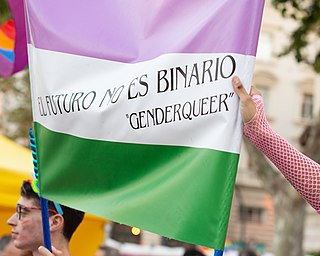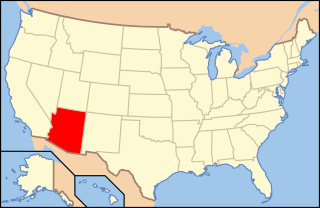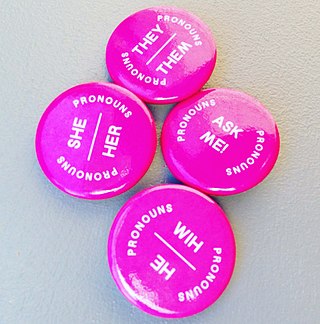Related Research Articles
The legal status of transgender people varies greatly around the world. Some countries have enacted laws protecting the rights of transgender individuals, but others have criminalized their gender identity or expression. In many cases, transgender individuals face discrimination in employment, housing, healthcare, and other areas of life.

Non-binary and genderqueer are umbrella terms for gender identities that are not solely male or female. Non-binary identities fall under the transgender umbrella, since non-binary people typically identify with a gender that is different from their assigned sex, though some non-binary people do not consider themselves transgender.

The Sex Discrimination Act 1975 was an Act of the Parliament of the United Kingdom which protected men and women from discrimination on the grounds of sex or marital status. The Act concerned employment, training, education, harassment, the provision of goods and services, and the disposal of premises.
United Kingdom employment equality law is a body of law which legislates against prejudice-based actions in the workplace. As an integral part of UK labour law it is unlawful to discriminate against a person because they have one of the "protected characteristics", which are, age, disability, gender reassignment, marriage and civil partnership, race, religion or belief, sex, pregnancy and maternity, and sexual orientation. The primary legislation is the Equality Act 2010, which outlaws discrimination in access to education, public services, private goods and services, transport or premises in addition to employment. This follows three major European Union Directives, and is supplement by other Acts like the Protection from Harassment Act 1997. Furthermore, discrimination on the grounds of work status, as a part-time worker, fixed term employee, agency worker or union membership is banned as a result of a combination of statutory instruments and the Trade Union and Labour Relations (Consolidation) Act 1992, again following European law. Disputes are typically resolved in the workplace in consultation with an employer or trade union, or with advice from a solicitor, ACAS or the Citizens Advice Bureau a claim may be brought in an employment tribunal. The Equality Act 2006 established the Equality and Human Rights Commission, a body designed to strengthen enforcement of equality laws.
The Employment Equality Regulations 2003 were secondary legislation in the United Kingdom, which prohibited employers unreasonably discriminating against employees on grounds of sexual orientation, perceived sexual orientation, religion or belief and age.

The Equality Act 2010 is an Act of Parliament of the United Kingdom passed during the Brown ministry with the primary purpose of consolidating, updating and supplementing the numerous prior Acts and Regulations, that formed the basis of anti-discrimination law in mostly England, Scotland and Wales; some sections also apply to Northern Ireland. These consisted, primarily, of the Equal Pay Act 1970, the Sex Discrimination Act 1975, the Race Relations Act 1976, the Disability Discrimination Act 1995 and three major statutory instruments protecting discrimination in employment on grounds of religion or belief, sexual orientation and age.
Equality and diversity is a term used in the United Kingdom to define and champion equality, diversity and human rights as defining values of society. It promotes equality of opportunity for all, giving every individual the chance to achieve their potential, free from prejudice and discrimination.

Lesbian, gay, bisexual, and transgender (LGBT) persons in the U.S. state of Pennsylvania enjoy most of the same rights as non-LGBT residents. Same-sex sexual activity is legal in Pennsylvania. Same-sex couples and families headed by same-sex couples are eligible for all of the protections available to opposite-sex married couples. Pennsylvania was the final Mid-Atlantic state without same-sex marriage, indeed lacking any form of same-sex recognition law until its statutory ban was overturned on May 20, 2014.

Lesbian, gay, bisexual, and transgender (LGBT) people in the U.S. state of Arizona may face legal challenges not experienced by non-LGBT residents. Same-sex sexual activity is legal in Arizona, and same-sex couples are able to marry and adopt. Nevertheless, the state provides only limited protections against discrimination on the basis of sexual orientation and gender identity. Several cities, including Phoenix and Tucson, have enacted ordinances to protect LGBT people from unfair discrimination in employment, housing and public accommodations.

Lesbian, gay, bisexual, and transgender (LGBT) persons in the U.S. state of Indiana enjoy most of the same rights as other people. Same-sex marriage has been legal in Indiana since October 6, 2014, when the U.S. Supreme Court refused to consider an appeal in the case of Baskin v. Bogan.

Lesbian, gay, bisexual, and transgender (LGBT) persons in the U.S. state of Nebraska may face some legal challenges not experienced by non-LGBT residents. Same-sex sexual activity is legal in Nebraska, and same-sex marriage has been recognized since June 2015 as a result of Obergefell v. Hodges. The state prohibits discrimination on account of sexual orientation and gender identity in employment and housing following the U.S. Supreme Court's ruling in Bostock v. Clayton County and a subsequent decision of the Nebraska Equal Opportunity Commission. In addition, the state's largest city, Omaha, has enacted protections in public accommodations.
Discrimination against non-binary people, or people who do not identify exclusively as male or female, may occur in social, legal, or medical contexts. Both cisgender and transgender people can display such prejudice, as well as members of the lesbian, gay, and bisexual communities.
P v S and Cornwall County Council was a landmark case of the European Court of Justice (ECJ) which extended the scope of sex equality to discrimination against transsexuals.

The Equality Act is a bill in the United States Congress, that, if passed, would amend the Civil Rights Act of 1964 to prohibit discrimination on the basis of sex, sexual orientation and gender identity in employment, housing, public accommodations, education, federally funded programs, credit, and jury service. The Supreme Court's June 2020 ruling in Bostock v. Clayton County protects gay and transgender people in matters of employment, but not in other respects. The Bostock ruling also covered the Altitude Express and Harris Funeral Homes cases.

Transgender and non-binary people in New Zealand face discrimination in several aspects of their lives. The law is unclear on the legal status of discrimination based on gender identity, and also for intersex people.

Multiple countries legally recognize non-binary or third gender classifications. These classifications are typically based on a person's gender identity. In some countries, such classifications may only be available to intersex people, born with sex characteristics that "do not fit the typical definitions for male or female bodies."
Transgender rights in the United Kingdom have varied significantly over time, with the British transgender community facing ongoing challenges not experienced by cisgender Britons. These include various laws and public attitudes in regards to identity documents, as well as anti-discrimination measures used by or pertaining to transgender people, in the areas of employment, education, housing and social services, amongst others.

Preferred gender pronouns or personal gender pronouns are the set of pronouns that an individual wants others to use in order to reflect that person's gender identity. In English, when declaring one's chosen pronouns, a person will often state the subject and object pronouns, although sometimes, the possessive pronouns are also stated. The pronouns chosen may include neopronouns such as "ze" and "zir".
Forstater v Centre for Global Development Europe is a UK employment and discrimination case brought by Maya Forstater against the Center for Global Development (CGD). The Employment Appeal Tribunal decided that gender-critical views are capable of being protected as a belief under the Equality Act 2010. The tribunal further clarified that this finding does not mean that people with gender-critical beliefs can express them in a manner that discriminates against trans people.
References
- ↑ "Landmark case could be key to developing gender-fluid inclusion in the workplace; Taylor v Jaguar Land Rover". Thrive Law. 30 November 2020. Retrieved 10 June 2021.
- ↑ "Diversity and inclusion: Key steps to support non-binary employees after landmark ruling". Legalease Law Journals. November 2015. Retrieved 10 June 2021.
- ↑ "Equality Act 2010". The National Archives. Retrieved 10 June 2021.
- ↑ Morton, Melanie (3 December 2020). "Gender Reassignment Discrimination l Taylor v Jaguar Land Rover Ltd". Nelsons. Retrieved 10 June 2021.
- ↑ "Taylor v Jaguar Land Rover". pjhlaw. PJH Law. 16 October 2020. Retrieved 10 June 2021.
- ↑ "Ms R Taylor v Jaguar Land Rover Ltd: 1304471/2018". GOV.UK. HM Courts & Tribunals Service. 21 September 2020. Retrieved 10 June 2021.
- ↑ "Inclusion of non-binary employees: What employers need to know following Taylor v Jaguar Land Rover". Addleshaw Goddard. 19 May 2021. Retrieved 10 June 2021.
- ↑ "Gender-fluid worker wins Jaguar Land Rover tribunal". BBC News . 16 September 2020. Retrieved 10 June 2021.
- ↑ Parsons, Vic (5 October 2020). "Jaguar Land Rover ordered to pay £180,000 to genderfluid engineer after relentless campaign of harassment". PinkNews . Retrieved 10 June 2021.
- ↑ Mullen, Enda; Rodger, James (29 September 2020). "JLR apologises to former employee over harassment and discrimination". BirminghamLive . Retrieved 10 June 2021.
- ↑ Wareham, Jamie (16 September 2020). "Non-Binary People Protected By U.K. Equality Act, Says Landmark Ruling Against Jaguar Land Rover". Forbes . Retrieved 10 June 2021.
- ↑ Cooke, Adam; Davies, Oscar (2 December 2020). "A substantive review of the landmark decision in Taylor v Jaguar Land Rover Limited and the protection it provides for those who identify as non-binary and gender fluid under the Equality Act 2010". Lamb Chambers. Retrieved 10 June 2021.
- ↑ Hardy, Lizzie (12 October 2020). "Non-binary/gender fluid claimants". The Law Society Gazette . Retrieved 10 June 2021.